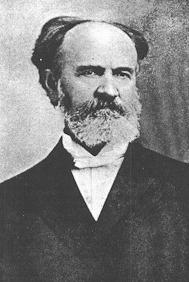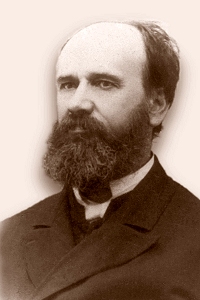 |
Born: December 15, 1843, Bayview, Prince Edward Island,
Canada.
Died: October 29, 1919, Nyack, New York. Buried: Nyack College, New York. |
 |
 |
Born: December 15, 1843, Bayview, Prince Edward Island,
Canada.
Died: October 29, 1919, Nyack, New York. Buried: Nyack College, New York. |
 |
Albert Simpson was the third son and fourth child of James Simpson, Jr., and Janet Clark. His family’s strict Calvinistic Scottish Presbyterian and Puritan background formed Albert’s view of his spiritual standing. It sent him searching until he apparently had to seek his doctor’s advice as a youth. Albert was also undoubtedly exposed to solid Christian classics, as were many in the spiritual traditions of the time. It is known that he read Marshall’s Gospel Mystery of Salvation (1692), which brought the 15-year-old youth to a balanced understanding of salvation and Christian holiness.
One influence on Simpson’s missionary fervor may have been Rev. John Geddie. In 1847, Geddie went to the New Hebrides in the South Pacific as a missionary; reportedly a whole island turned to Christ under his ministry. The Geddie memorial in Prince Edward Island says, “When he arrived in 1848, there were no Christians; when he left in 1872, there were no heathen.”
After finishing high school, Albert taught for a while to earn money to enter Knox College at the University of Toronto. At age 21, he graduated and received calls to two churches. One was a small rural congregation, the other the large Knox Presbyterian Church in Hamilton, Ontario. He wrestled between these calls, finally choosing Knox Presbyterian so God could use him as widely as possible. After eight years of highly successful ministry and the addition of 750 new church members, it was said “He was second to none in eloquence and ability and success in his ministry” (A. E. Thompson, A. B. Simpson, His Life and Work, Christian Publications).
In December 1873, Simpson was called to the pulpit of the largest Presbyterian church in Louisville, Kentucky, the Chestnut Street Presbyterian Church. There he joined city wide evangelistic endeavors which opened his eyes to a more active evangelistic ministry of his own. A letter written by Simpson’s father in 1877 to a nephew speaks of his two sons, Howard and Albert:
In response to your request I will give you a brief account of our family. My two oldest sons as you are aware are Ministers of the Gospel. Howard is in the City of Madison, Indiana and Albert is in Louisville, Kentucky. Both are well provided for with regard to the things of this world…I trust they are both laboring faithfully and successfully. Albert indeed is killing himself with hard labor have established mission stations through the whole City which has a population of 150,000 and 30,000 of who go to no place of worship. His own Congregation has doubled since he went to it three years ago.
After five years and reaching a plateau of ministry in Louisville, Albert was called to New York City to pastor the Thirteenth Street Presbyterian Church. There he was drawn to the masses of immigrant population; indeed, he found a mission field at his door. After leading 100 or so Italian immigrants to Christ, his congregation suggested that they might find another church to attend. Simpson decided then that God was calling him “to a different work” and he left to begin his ministry to the masses in New York.
God’s call on Simpson’s life resulted in a twofold vision. First, the message of the fullness of Christ and its centrality of Christ in doctrine was his Biblical message. This became what he called the Fourfold Gospel: Jesus Christ our Savior, Sanctified, Healer, and Coming King. Simpson attributed the term, Fourfold Gospel, to a suggestion of the Holy Spirit at the opening of the 1890 convention at the New York Gospel Tabernacle. This formulation has been used by the Assemblies of God as well as the Four Square churches. Second, a vision of a lost and perishing world compelled Simpson to send his first missionary evangelistic teams to the Congo. Simpson’s belief and strategy were that Spirit filled people living a Christ like life become active servants. The outcome of these twin visions was the development his Christ centered message and the extension of his local church’s ministry into what has become today the Christian and Missionary Alliance (CAMA).
For Simpson, the ministry was all encompassing. He wrote once about how he was being divinely led in development of his local church ministry:
He is showing us the plan for a Christian church that is much more than an association of congenial friends to listen once a week to an intellectual discourse and musical entertainment and carry on by proxy a mechanism of Christian work; but rather a church that can be at once the mother and home of every form of help and blessing which Jesus came to give to lost and suffering men, the birthplace and the home of souls, the fountain of healing and cleansing, the sheltering home for the orphan and distressed, the school for the culture and training of God’s children, the armory where they are equipped for the battle of the Lord and the army which fights those battles in His name. Such a center of population in this sad and sinful world!
A Larger Christian Life, Albert Simpson
On another occasion, in a quite similar tone, Simpson wrote,
We should aim to bring all the work of God within the sphere of the church of Christ. There is room not only for the worship of God, the teaching of sacred truth and the evangelization of the lost, but also for every phase of practical philanthropy and usefulness. There may be, in perfect keeping with the simple order and dignity of the church of God, the most aggressive work for the masses and the widest welcome for every class of sinful men; the ministry of healing for the sick and suffering administered in the name of Jesus; the most complete provision for charitable relief; industrial training and social elevation for the degraded classes; workshops for the unemployed; homes for the orphaned; shelter for the homeless; missions for the heathen; and every agency needed to make the church of God the light of the world and mother of the suffering and lost. And there is no work that will be more glorifying to God than a church that will embrace just such features and completeness. May the Lord help us yet to realize the vision, and present at His own blessed coming His own fair bride and her multitudes of children.
But as socially minded as these statements sound, Simpson nurtured a deep passion for the evangelization of earth in his early followers. He said,
living men; so that everyone may have the opportunity of salvation, and the Bride of Christ may be gathered in from all nations, tribes and tongues, the fulness of the Gentiles brought in, and the way fully prepared for the Lord’s return.
In his powerful hymn, “The Missionary Cry,” he wrote,
The Master’s coming draweth near.
The Son of Man will soon appear,
His Kingdom is at hand.
But ere that glorious day can be,
The Gospel of the Kingdom, we
Must preach in every land.